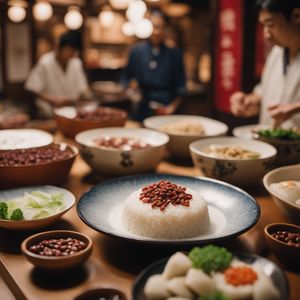
Dish
Kemalpaşa
Kemalpaşa is made by mixing soft cheese with semolina, flour, and sugar. The mixture is then shaped into small balls and boiled in a syrup made from sugar, water, and lemon juice. Once cooked, the balls are left to cool and served chilled.
Origins and history
Kemalpaşa is named after the town of Kemalpaşa in western Turkey, where it originated in the 19th century. It was created by a Greek pastry chef named Alexander, who worked in the town's pastry shop. The dessert became popular among the locals and spread throughout Turkey.
Dietary considerations
Kemalpaşa is not suitable for vegans or those with lactose intolerance. It is high in sugar and should be consumed in moderation.
Variations
Kemalpaşa can be made with different types of cheese, such as ricotta or cottage cheese. Some recipes also call for the addition of nuts or spices. However, the traditional recipe only includes soft cheese, semolina, flour, and sugar.
Presentation and garnishing
Kemalpaşa is typically served in a bowl or on a plate. It can be garnished with chopped nuts or fresh fruit. To prevent the cheese mixture from sticking to your hands while shaping it into balls, try wetting your hands with cold water.
Tips & Tricks
When boiling the cheese balls, make sure to stir them gently to prevent them from sticking to the bottom of the pot. Once cooked, let them cool completely before serving to allow the syrup to soak into the cheese balls.
Side-dishes
Kemalpaşa is often served on its own, but it can also be accompanied by a dollop of whipped cream or a scoop of ice cream.
Drink pairings
Kemalpaşa is usually served with tea or Turkish coffee. However, it can also be paired with a glass of cold milk or a sweet dessert wine.
Delicious Kemalpaşa recipes
More dishes from this category... Browse all »

Aamras
Indian cuisine

Aasmi
Indian cuisine

Agra petha
Indian cuisine

Aiyùbīng
Taiwanese cuisine

Ajdnek
Slovenian cuisine

Akafuku
Japanese cuisine

Akanés
Greek cuisine

Akumaki
Japanese cuisine
More cuisines from this region...

Assyrian cuisine
Savory, Tangy, Earthy, Herbaceous, Nutty

Caucasian cuisine
Spicy, Savory, Tangy, Herbaceous

Eastern Arabian cuisine
Spicy, Savory, Aromatic, Tangy, Sweet

Iranian cuisine
Savory, Spicy, Sweet, Tangy

Levantine cuisine
Fresh, Light, Healthy, Tangy, Savory

Pontic Greek cuisine
Bold, Hearty, Spicy, Tangy, Savory

